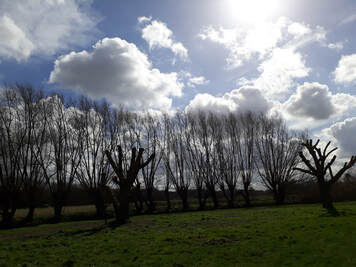
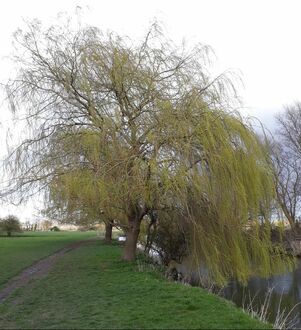
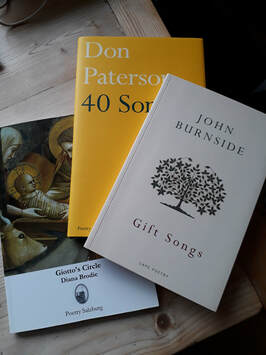
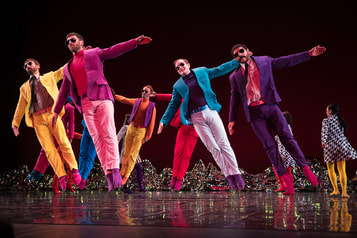 Photo: Mat Hayward
Photo: Mat Hayward 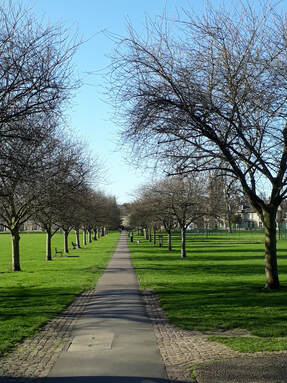
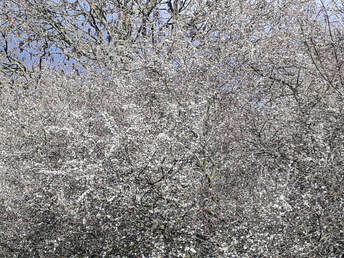
|
|
 So despite the frosty start to the morning's run, with the Equinox behind us and the clocks having gone forward at the weekend, it seems that Spring is here. (Who would have thought that, after all those long-distance runs were firmly consigned to my pre-Parkinson's past, I'd be casually mentioning 'the morning's run'?!) Days of heavenly blue skies and, after the early chill, warm sun. One morning a fabulous walk through Grantchester Meadows for lunch in The Red Lion. In a pot outside my window there's a clump of delicately buttery primroses although a visit to a friend round the corner puts my small spread into perspective. In her beautiful garden primroses have sprung up everywhere, along with a blaze of yellow jasmine and a sea of clear blue periwinkle by the gate. Even so, almost everything on my balcony seems to be coming into leaf or sprouting new growth, with last year’s birthday clematis armandii a riot of almond-scented flowers and lots of grape hyacinth below the birches. Only the Christmas tree (Mark 2) is struggling so it’s looking likely that we’ll need a Mark 3 for next Christmas.  My dad is always lurking on the edge of my mind at this time of year, due in part to his St Patrick’s Day birthday and partly to poet Philip Larkin, whose seasonal marker ‘The Trees’ I read at my dad's funeral, almost 17 years ago. Which makes it almost 3 years since we lost Mum. Larkin’s poem is characteristically double-edged: the poet finds in the new green ‘a kind of grief’. Still, the trees' ultimate message, if they have one, is hope in the possibility of new life, as they ‘begin afresh, afresh, afresh’. My dad, Fred, died in April, the day after my birthday, Mum (Clarice) later in the month. In the light of yesterday's Mother's Day Di and I agreed, as part of our Mapping Memory project, that we would each write a letter to our mothers. Yesterday afternoon a further reminder landed in my inbox: a Youtube link to poet Alice Willitts reading in her garden a poem for her mother from her new pamphlet 'Dear'. The pamphlet, on the theme of mothers and daughters, is based on the last years of her mother's life with Parkinson's.  Parkinson’s is something of a preoccupation at present, not least as a result of the generosity of Cambridge poet Diana Brodie who recently donated her remarkable and extensive collection of poetry to our Amnesty Bookshop. I wasn't familiar with Diana's work although I knew of the award recognising her work on behalf of Parkinson's UK and the fact that she drew inspiration from her experience of the condition. Our poetry stock has been somewhat depleted since Christmas so the arrival of lots of new titles, from vintage Auden to the best of contemporary writers, all evidently well-cared for, has brought a breath of spring to our shelves. Watch this space for a 'Gone but not Forgotten' window display celebrating twentieth century poets.  Photo: Mat Hayward Photo: Mat Hayward Parkinson's is rarely a cause for celebration. So the launch of the Mark Morris Dance Company's UK Pepperland tour at Sadler's Wells on 20th March was an occasion of especial joy and reaffirmed their commitment to Dance for PD. From their first class for people with Parkinson's in Brooklyn in 2001, Dance for Parkinson's has grown into a worldwide movement. It's years since my discovery of English National Ballet's involvement in the programme and my initial negative response. Taking part in their two-day training for dance professionals was enough to convert me and subsequently participating in the Ipswich classes taught me some of the bonuses of being part of a 'special' group. In 2018 I was one of seven people living with Parkinson's to become an adviser to the Dance for Parkinson's Partnership UK Practice Group and on 21st March this year I attended as a delegate a one-day international symposium on the theme of 'Looking Ahead'. I'm still processing the experience, a challenging and thought-provoking one. The evening saw an extra event hosted by dancer Danielle Teale in partnership with the National Hospital for Neurology and Neurosurgery, which offered a window on ongoing research in the context of a regular dance class at the hospital. I was inspired by the collaborative nature of this enterprise – Danielle is 'still asking the dancers what they want the research question to be' – and also by the news that she is working on other projects incorporating performance work with dancers with Parkinson's. I'm very much hoping to become involved myself at some point.  I'm rather at a loss, though, how to share what seem to me significant experiences although I'm feeling I want to share them, and not just in writing. Or perhaps it's how to integrate them into the rest of my life? Much of what I do and am is separate and also solitary: I live alone, read and write alone (usually), run alone. I'm excited that my book Parkinson’s & the Tango Effect is happening at last – an online conversation with Unbound's editors about the cover this week – although this is something else I struggle to talk about openly. What's more, increasingly I'm finding it difficult to take part fully in social events. This weekend found me perched on the edge of a gathering of friends, unable to contribute even when the conversation turned to something I'm well-practised in: 'me time' or the art of being alone. It begins to feel as if I am the embodiment of the proverbial elephant! I've mentioned before that sinking sensation as my confidence ebbs, an echo I fear of my mother's difficulties in engaging socially as her dementia took hold. Coupled with my troublesome gut, a source of endless low-level misery which threatens to capsize potential travel opportunities and even my tango habit, I can only scuttle away with barely a polite goodbye.  Well. As my own birthday and its small gathering approaches, at least I will be on home turf. I'm looking forward to the Tulip Run on the Sunday morning and to more early miles along the river as spring becomes summer. Weirdly, as my symptoms generally become more taxing, my stability more precarious, I’m finding that running, rather like dancing, seems to take me to a Parkinson’s-free zone. I’m also counting down now to the end of Lent – I'm already thinking of a glass of very good Italian red! – and to reading some of what promise to be wonderful books which have accumulated around me over the last few weeks, Ali Smith’s latest Spring about to be added to the top of the pile. For the rest? I hope for the continued patience of friends. And whilst I can't claim any residual faith in whatever might be 'out there', I will be in the queue as usual outside King's on the morning of Good Friday for the annual 'Ante-Communion & Veneration of the Cross' music & readings and hope that Easter might bring just a taste of what Hopkins described as a 'crimson-cresseted east’.
2 Comments
18/3/2020 12:08:19 pm
Spring is one of the most beautiful seasons that we are blessed to experience. I actually have some deep sentiments with this season most especially since this symbolizes new beginnings for me. Also, I get to experience lots of good things during this season which made it more special. I know that out of all people, you are one of those individuals who actually understand what I feel. I can’t wait to experience the same things once Spring comes. There will surely be some changes that will happen which will make everything better.
Reply
22/4/2022 06:01:03 am
I like the season of spring. In this season, humidity and chilled is not exceed. It is comfortable weather for everyone. I enjoy this season too much. I take some nice pictures of beautiful flowers and plants and upload on internet .I use a free VPN for this .
Reply
Leave a Reply. |
At HomeAs Writer in Residence, thoughts from the garden Archives
October 2020
Categories |